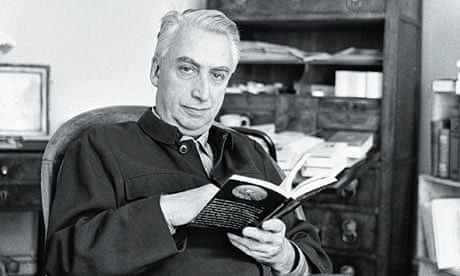Ecclesiastes famously warns us that "Of making many books there is no end" – the same, of course, applies to book commentaries. George Steiner has long denounced the "mandarin madness of secondary discourse" which increasingly interposes itself between readers and works of fiction. For better or worse, the internet – with its myriad book sites – has taken this phenomenon to a whole new level. Since Aristotle's Poetics, literature has always given rise to its exegesis, but now that no scrap of literary gossip goes untweeted, it may be time to reflect a little on the activity of literary criticism.
I have chosen to inaugurate this series with a few considerations on "The Death of the Author" because of its truly iconic nature: it symbolises the rise of what would come to be known as "theory". Even if he never names them, Roland Barthes (like Proust before him) launches an attack on the traditional biography-based criticism à la Sainte-Beuve or Lanson which still dominated French academia in the sixties. The paradox, of course, is that this essay – with its symbolic slaying of the paternal "Author-God" – could lend itself to a textbook psychological reading given that Barthes lost his own father before his first birthday. The "Death of the Author" theme itself takes on added meaning, in hindsight, when you consider that Barthes's critical career was, at least in part, a displacement activity to avoid writing the novel he dreamed of. Does any of this invalidate his theories? I'll let you be the judge of that...
In 2002, the prestigious Pompidou Centre in Paris devoted a major exhibition, not to an artist, philosopher, scientist or novelist, but a literary critic: Roland Barthes. Now that the "theory wars" – which had once torn apart literature departments on both sides of the Atlantic – were largely over, it served as a reminder of a time when a posse of structuralists and post-structuralists superseded the likes of Jean-Paul Sartre as France's premier intellectual icons. Many of them were primarily philosophers, anthropologists, historians, linguists or psychoanalysts – Jacques Lacan, Michel Foucault, Gilles Deleuze, Julia Kristeva et al – but the locus of this intellectual revolution was undoubtedly literary criticism.
La nouvelle critique was flavour of the month, much like its culinary counterpart, nouvelle cuisine, albeit more of a mouthful. Critics-cum-thinkers such as Barthes himself – who was equally at home at the lofty Collège de France or down the trendy Le Palace nightclub – achieved bona fide celebrity status. Their works often became bestsellers in spite of their demanding and iconoclastic nature. Soon, NME journalists were peppering their articles with arcane references to Baudrillard while Scritti Politti dedicated a postmodern ditty to Jacques Derrida. The whole movement seemed as provocative, and indeed exciting, as Brigitte Bardot in her slinky, sex kitten heyday. Its defining moment was the publication of a racy little number called "The Death of the Author".
As if mimicking one of its central themes, Roland Barthes's article first featured in an American journal in 1967: the original (an English translation of a French text) was thus, in effect, already a copy. With a nice sense of historical timing, it appeared in the critic's homeland in the quasi-insurrectionary context of the 1968 student protests. As it was only anthologised much later (first in Image-Music-Text in 1977 and then in The Rustle of Language in 1984), the essay was photocopied and distributed samizdat-fashion on campuses all over the world, which enhanced its subversive appeal.
Subversive, it certainly was. In France, perhaps more than anywhere else, the secularisation of society (compounded by the Republic's struggle against the Roman Catholic Church) had led to the adoption of art and literature as substitute religions. Nietzsche had announced the death of God only to see Him replaced by the "Author-God". Enter Roland Barthes.
His starting-point is a sentence lifted from Sarrasine (1830), a little-known Balzac novella about an artist who falls in love with a young castrato he believes to be a woman. Barthes (who was gay) was so taken with this gender-bending tale of mistaken identity that he would study it at length in S/Z (1970). Here, he draws a parallel between the ambiguity of Sarrasine's feelings and the ambiguous identity of the speaker who, ironically, describes the castrato as the essence of womanhood. Is it the deluded, love-struck protagonist? The narrator? Balzac the writer? Balzac the man?... Having exhausted all possibilities, the critic draws the conclusion that it is impossible to say for sure who the sentence should be attributed to. He goes on to describe literature as a space "where all identity is lost, beginning with the very identity of the body that writes". The death of the author marks the birth of literature, defined, precisely, as "the invention of this voice, to which we cannot assign a specific origin".
Indeed, the "modern writer" – or "scriptor" as Barthes calls him – can only mimic "a gesture forever anterior, never original" by recombining what has already been written. Whereas the "Author-God" maintained with his work "the same relation of antecedence a father maintains with his child," the scriptor "is born simultaneously with his text": for him, "there is no other time than that of the utterance, and every text is eternally written here and now". As Barthes puts it, apropos of Mallarmé, "it is language which speaks, not the author" – or the scriptor for that matter. Works of fiction are palimpsests and as such are devoid of any "single 'theological' meaning (the 'message' of the Author-God)". The key to a text is not to be found in its "origin" but in its "destination": "the birth of the reader must be at the cost of the death of the Author".
Next time, I'm planning to investigate the notion of mimetic desire – unless there's anywhere else you'd rather visit first. Suggestions on future topics are most welcome...

Comments (…)
Sign in or create your Guardian account to join the discussion